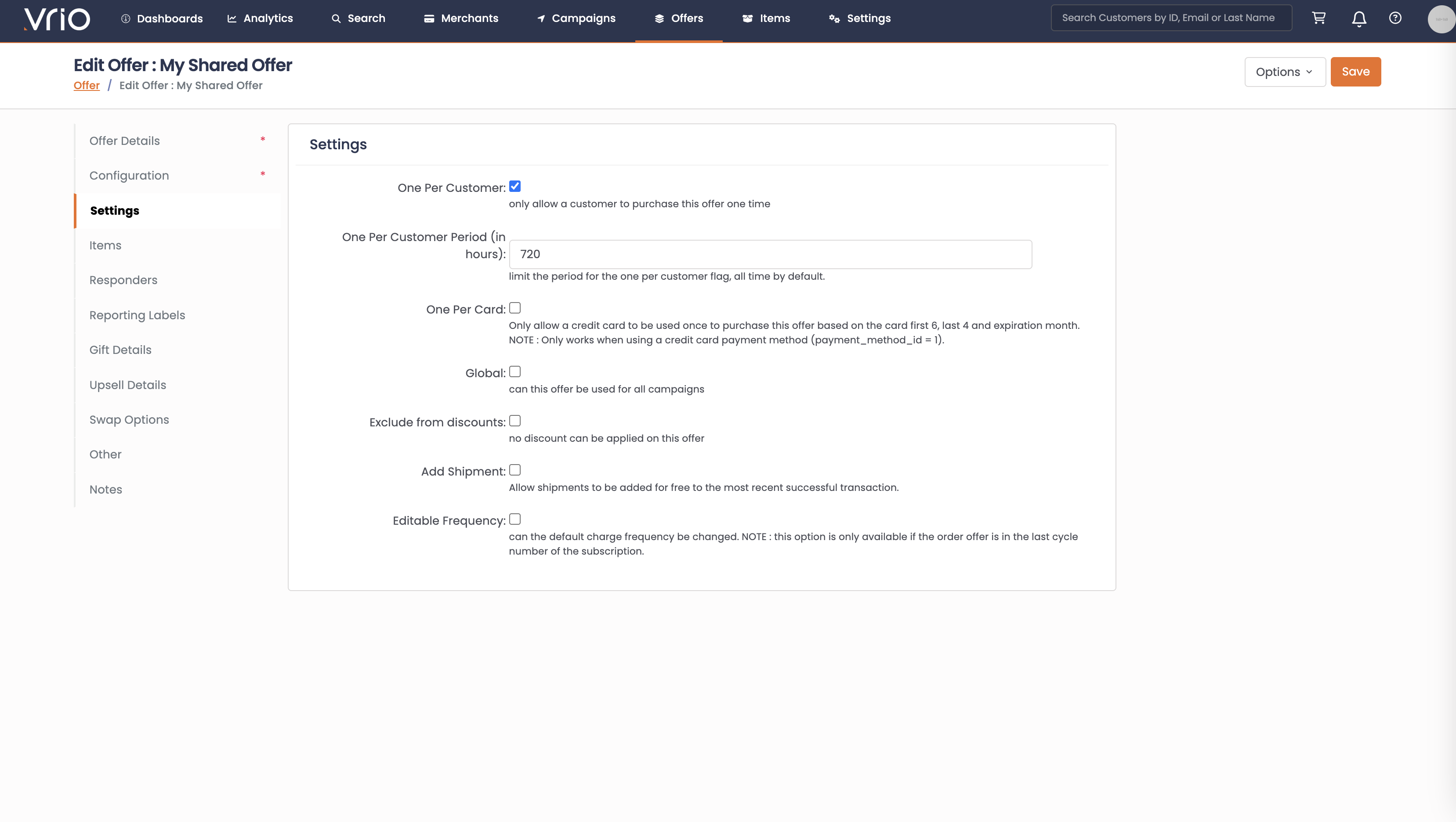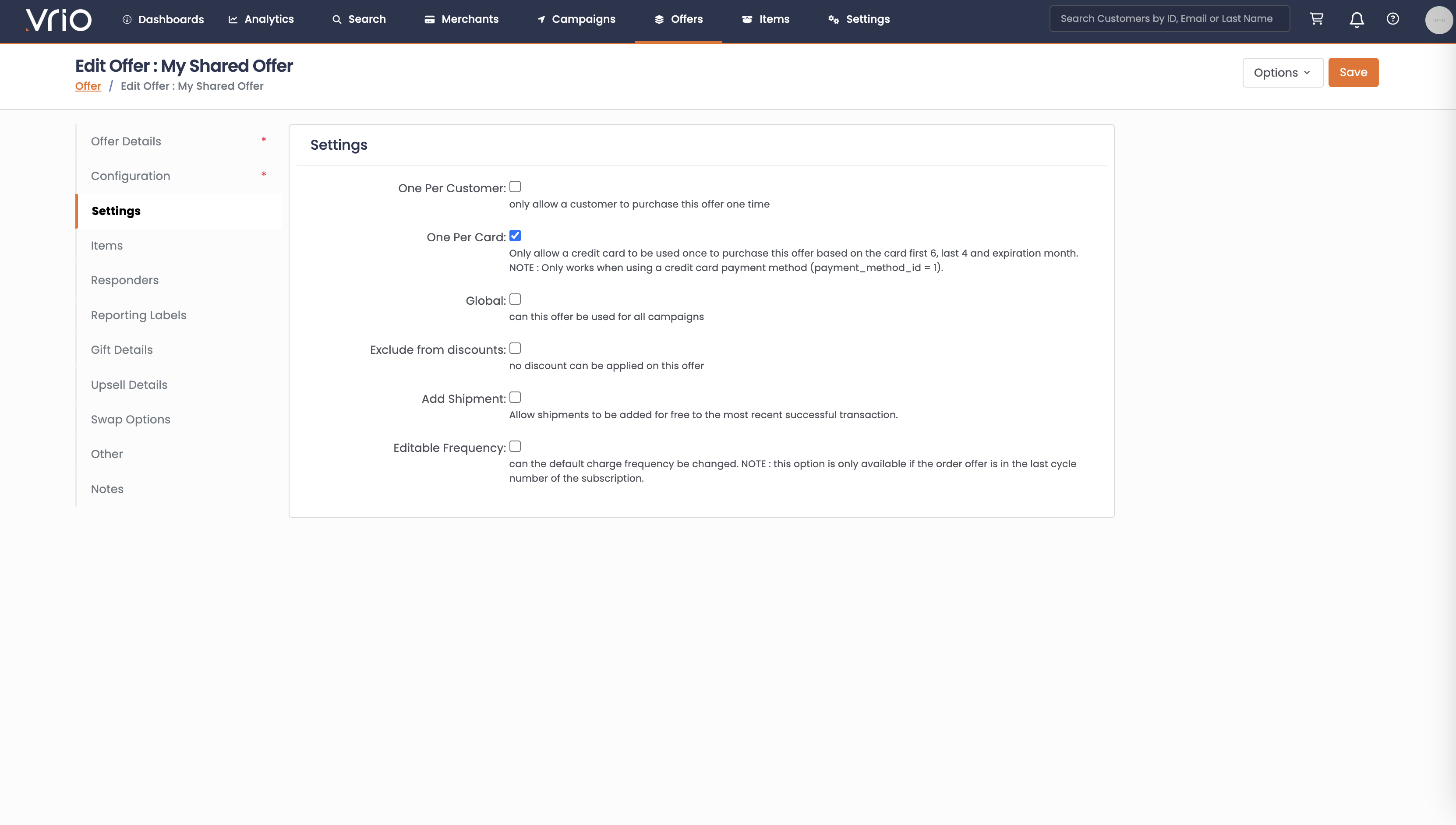Customer Management & Controls
Configure customer restrictions, subscription controls, and self-service options to protect your business while giving customers flexibility.
This guide covers how to configure customer restrictions, subscription controls, and self-service options in your offers. These settings help protect your business from abuse while giving legitimate customers the flexibility they need to manage their subscriptions effectively.
From purchase limits that prevent fraud to skip options that reduce cancellations, this guide will help you understand and configure the customer management features that work best for your business model.
Why Customer Controls Matter
Smart customer management isn't just about restrictions - it's about:
- Preventing fraud and abuse with purchase limits and restrictions
- Reducing cancellations by giving customers flexibility to pause or skip
- Protecting your business from chargebacks and disputes
- Improving customer satisfaction through self-service options
- Maintaining subscription value by preventing gaming of trial offers
Purchase Limits & Restrictions
Control who can purchase your offers and how often to prevent abuse and protect your business model.
One Per Customer
Limit customers to one purchase of this offer, ever. This is enforced by email address across all payment methods.
When to use:
- Trial offers to prevent repeat trial abuse
- Limited-time promotions
- First-time customer bonuses
- High-value offers with special pricing
How it works:
- Vrio checks email address against all previous orders
- Blocks duplicate purchases even with different payment methods
- Applies across all campaigns using this offer
One Per Customer Period (Optional):
You can enhance this restriction with a time-based period setting. Instead of blocking forever, you can limit purchases within a set number of hours. This is typically used as a fraud reduction tool.
- Set a specific number of hours (e.g., 24, 48, 720 for 30 days)
- Customers can purchase again after the period expires
- Useful for preventing rapid repeat purchases while allowing legitimate reorders later
Example: A $1 trial skincare subscription limited to one per customer prevents users from creating multiple accounts to get repeated trial pricing. With a 720-hour (30-day) period, customers could potentially purchase again after a month if you want to allow periodic trials.
To edit the One Per Customer setting on an offer, Navigate to the offer you want to edit and click on the Settings tab.

One Per Card
Limit customers to one purchase of this offer per payment method. Only available for credit card payment methods. Vrio determines the card using the card bin number, card last 4 digits, and expiration month.
When to use:
- Preventing card testing or fraud attempts
- Limiting promotional offers
- Reducing risk from stolen payment methods
How it works:
- Only applies to credit card payment methods
- Vrio checks the card bin number, last 4 digits, and expiration month
- Same card cannot be used for multiple purchases of this offer
- Creates a unique fingerprint for each payment method
To edit the One Per Card setting on an offer, Navigate to the offer you want to edit and click on the Settings tab.

Subscription Management Controls
Give customers control over their subscriptions while protecting your business interests.
Skippable Transactions & Shipments
Allow customers to skip upcoming transactions and/or shipments without cancelling their subscription entirely.
How skipping works:
Skip Transaction:
- Marks the transaction and any related shipments as skipped
- Schedules the next transaction and shipment based on the offer cycle configuration
- No billing occurs for the skipped cycle
Skip Shipment Only:
- Skips just the shipment, not the billing
- Schedules the next shipment and pushes any billing out based on the shipment schedule
- Useful for customers who want to continue paying but pause delivery
Benefits for your business:
- Reduces cancellations: Customers skip instead of cancelling
- Maintains subscription value: Customer relationship continues
- Improves satisfaction: Flexibility increases loyalty
Benefits for customers:
- Skip during vacation or travel
- Skip when they have product oversupply
- Manage temporary budget constraints
For detailed skipping configuration and setup, see: Skipping Renewals and Shipments Guide
Pause Subscriptions
Allow customers to temporarily pause their entire subscription.
How pause works:
When it's time for the customer to bill, Vrio will skip the transaction and schedule the next renewal at that time based on the offer's billing frequency.
When customers pause:
- All future billing stops
- All future shipments stop
- Subscription can be reactivated later
- Customer account and preferences remain intact
Use cases:
- Extended travel or deployment
- Seasonal usage products
- Temporary financial hardship
- Medical or personal reasons
For detailed pause configuration and setup, see: Offer Pausing Guide
Frequency Changes
Allow customers to change their subscription frequency (e.g., monthly to bi-monthly).
Common frequency options:
- Every 30 days → Every 60 days
- Monthly → Bi-monthly
- Weekly → Every 2 weeks
When to enable:
- Products with variable consumption rates
- Customers requesting frequency changes via support
For detailed setup instructions, see: Frequency Editing Configuration Guide
Offer Swapping
Allow customers to switch between different offers without cancelling and restarting their subscription.
How Offer Swapping Works
When a customer swaps offers, the renewal for the current offer is cancelled and a new renewal transaction is created on the new offer's schedule along with any associated shipments.
Benefits
For customers:
- Seamless switching between product options
- No loss of subscription history or preferences
- Avoid cancellation fees or restart friction
For your business:
- Prevent cancellations when customers want different products
- Cross-sell to different offers within your ecosystem
- Maintain customer lifetime value through transitions
For detailed configuration instructions, see: Offer Swapping Setup Guide
Expiration Dates & Time Limits
Offer Expiration
Offer expiration allows you to set a date when the offer will be moved to an expired status. This is useful for time-limited programs where customers sign up but the offer itself expires after a certain period.
Example use case:
A VIP membership program where customers sign up for exclusive benefits, but the offer expires after one year and they need to re-enroll.
How it works:
- Set an expiration date on the offer
- Offer automatically moves to expired status on that date
- Existing subscriptions continue but new signups are prevented
For complete expiration configuration including reminders, see: Offer Expiration System Guide
Advanced Customer Controls
Gifting Controls
When offers are marked as "giftable":
- Purchase process includes gift recipient information
- Gift notifications and claim processes
- Gift subscription management separate from purchaser
For detailed gifting configuration and setup, see: Gift Offers Guide
Implementation Best Practices
Start Conservative
Begin with more restrictive settings and loosen them based on customer feedback and fraud patterns.
Monitor Usage Patterns
Track how customers use self-service features:
- Skip usage frequency and patterns
- Pause duration and frequency
- Frequency change adoption
- Support ticket reduction
Balance Flexibility with Protection
Find the sweet spot between customer convenience and business protection:
- Generous enough to improve satisfaction
- Restrictive enough to prevent abuse
- Clear enough to set proper expectations
Communicate Clearly
Make sure customers understand:
- What controls are available to them
- How to access self-service features
- Limitations and restrictions
- When they need to contact support
Remember: The goal is to give customers enough control to stay happy while protecting your business from abuse. Start with your biggest customer pain points and add controls that address those specific issues.
Updated 4 months ago
